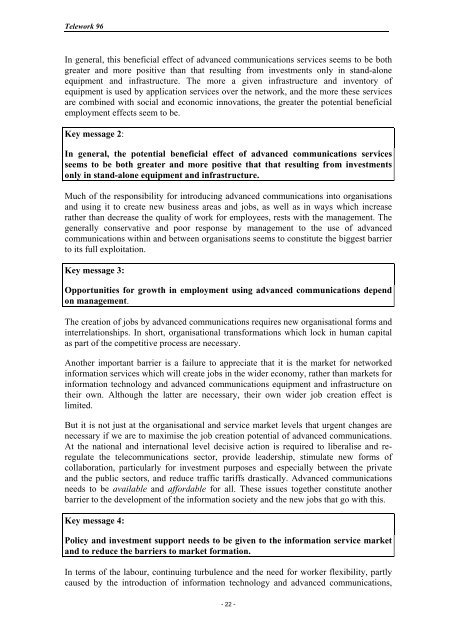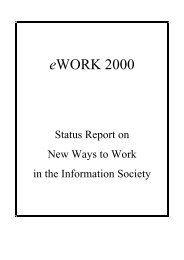1996 - European Telework Week
1996 - European Telework Week
1996 - European Telework Week
- No tags were found...
You also want an ePaper? Increase the reach of your titles
YUMPU automatically turns print PDFs into web optimized ePapers that Google loves.
<strong>Telework</strong> 96<br />
In general, this beneficial effect of advanced communications services seems to be both<br />
greater and more positive than that resulting from investments only in stand-alone<br />
equipment and infrastructure. The more a given infrastructure and inventory of<br />
equipment is used by application services over the network, and the more these services<br />
are combined with social and economic innovations, the greater the potential beneficial<br />
employment effects seem to be.<br />
Key message 2:<br />
In general, the potential beneficial effect of advanced communications services<br />
seems to be both greater and more positive that that resulting from investments<br />
only in stand-alone equipment and infrastructure.<br />
Much of the responsibility for introducing advanced communications into organisations<br />
and using it to create new business areas and jobs, as well as in ways which increase<br />
rather than decrease the quality of work for employees, rests with the management. The<br />
generally conservative and poor response by management to the use of advanced<br />
communications within and between organisations seems to constitute the biggest barrier<br />
to its full exploitation.<br />
Key message 3:<br />
Opportunities for growth in employment using advanced communications depend<br />
on management.<br />
The creation of jobs by advanced communications requires new organisational forms and<br />
interrelationships. In short, organisational transformations which lock in human capital<br />
as part of the competitive process are necessary.<br />
Another important barrier is a failure to appreciate that it is the market for networked<br />
information services which will create jobs in the wider economy, rather than markets for<br />
information technology and advanced communications equipment and infrastructure on<br />
their own. Although the latter are necessary, their own wider job creation effect is<br />
limited.<br />
But it is not just at the organisational and service market levels that urgent changes are<br />
necessary if we are to maximise the job creation potential of advanced communications.<br />
At the national and international level decisive action is required to liberalise and reregulate<br />
the telecommunications sector, provide leadership, stimulate new forms of<br />
collaboration, particularly for investment purposes and especially between the private<br />
and the public sectors, and reduce traffic tariffs drastically. Advanced communications<br />
needs to be available and affordable for all. These issues together constitute another<br />
barrier to the development of the information society and the new jobs that go with this.<br />
Key message 4:<br />
Policy and investment support needs to be given to the information service market<br />
and to reduce the barriers to market formation.<br />
In terms of the labour, continuing turbulence and the need for worker flexibility, partly<br />
caused by the introduction of information technology and advanced communications,<br />
- 22 -








